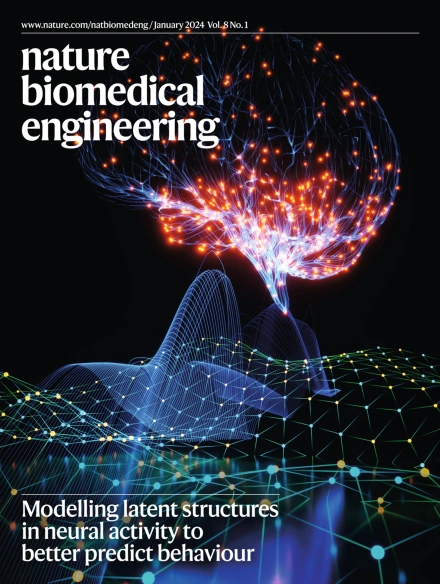A deep-learning model for quantifying circulating tumour DNA from the density distribution of DNA-fragment lengths
IF 26.8
1区 医学
Q1 ENGINEERING, BIOMEDICAL
引用次数: 0
Abstract
The quantification of circulating tumour DNA (ctDNA) in blood enables non-invasive surveillance of cancer progression. Here we show that a deep-learning model can accurately quantify ctDNA from the density distribution of cell-free DNA-fragment lengths. We validated the model, which we named ‘Fragle’, by using low-pass whole-genome-sequencing data from multiple cancer types and healthy control cohorts. In independent cohorts, Fragle outperformed tumour-naive methods, achieving higher accuracy and lower detection limits. We also show that Fragle is compatible with targeted sequencing data. In plasma samples from patients with colorectal cancer, longitudinal analysis with Fragle revealed strong concordance between ctDNA dynamics and treatment responses. In patients with resected lung cancer, Fragle outperformed a tumour-naive gene panel in the prediction of minimal residual disease for risk stratification. The method’s versatility, speed and accuracy for ctDNA quantification suggest that it may have broad clinical utility. A deep-learning model can accurately quantify circulating tumour DNA from the density distribution of cell-free DNA-fragment lengths in plasma from patients with cancer and from healthy individuals.


从DNA片段长度的密度分布定量循环肿瘤DNA的深度学习模型
血液中循环肿瘤DNA (ctDNA)的定量使癌症进展的非侵入性监测成为可能。在这里,我们展示了一个深度学习模型可以从无细胞dna片段长度的密度分布中准确地量化ctDNA。我们通过使用来自多种癌症类型和健康对照队列的低通全基因组测序数据来验证该模型,我们将其命名为“Fragle”。在独立队列中,Fragle优于肿瘤初始方法,实现更高的准确性和更低的检测限。我们还表明Fragle与靶向测序数据兼容。在结直肠癌患者的血浆样本中,Fragle的纵向分析显示ctDNA动态和治疗反应之间有很强的一致性。在切除的肺癌患者中,Fragle在预测最小残留疾病的风险分层方面优于肿瘤初始基因面板。该方法用于ctDNA定量的通用性、速度和准确性表明它可能具有广泛的临床应用。
本文章由计算机程序翻译,如有差异,请以英文原文为准。
求助全文
约1分钟内获得全文
求助全文
来源期刊

Nature Biomedical Engineering
Medicine-Medicine (miscellaneous)
CiteScore
45.30
自引率
1.10%
发文量
138
期刊介绍:
Nature Biomedical Engineering is an online-only monthly journal that was launched in January 2017. It aims to publish original research, reviews, and commentary focusing on applied biomedicine and health technology. The journal targets a diverse audience, including life scientists who are involved in developing experimental or computational systems and methods to enhance our understanding of human physiology. It also covers biomedical researchers and engineers who are engaged in designing or optimizing therapies, assays, devices, or procedures for diagnosing or treating diseases. Additionally, clinicians, who make use of research outputs to evaluate patient health or administer therapy in various clinical settings and healthcare contexts, are also part of the target audience.
 求助内容:
求助内容: 应助结果提醒方式:
应助结果提醒方式:


